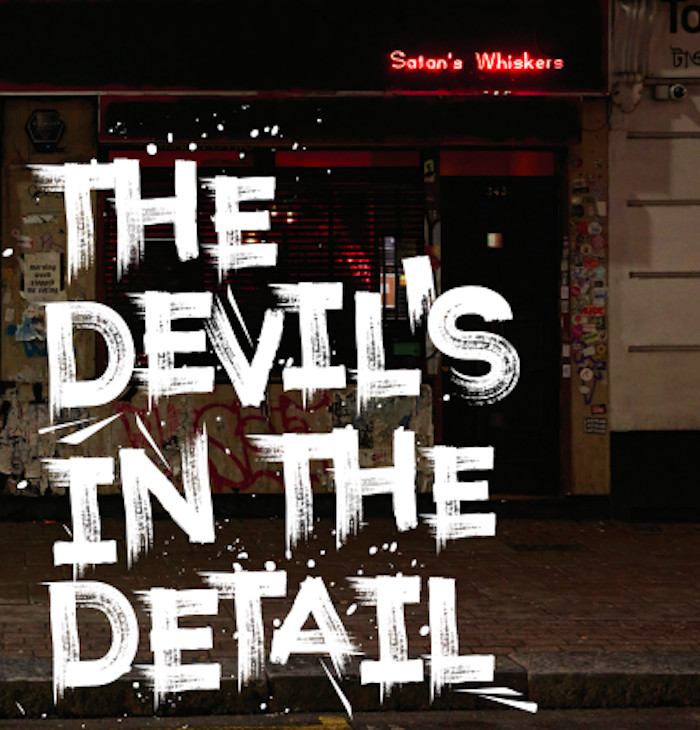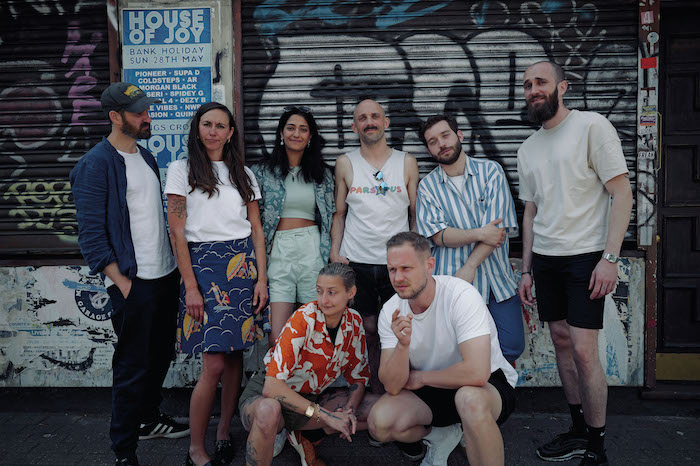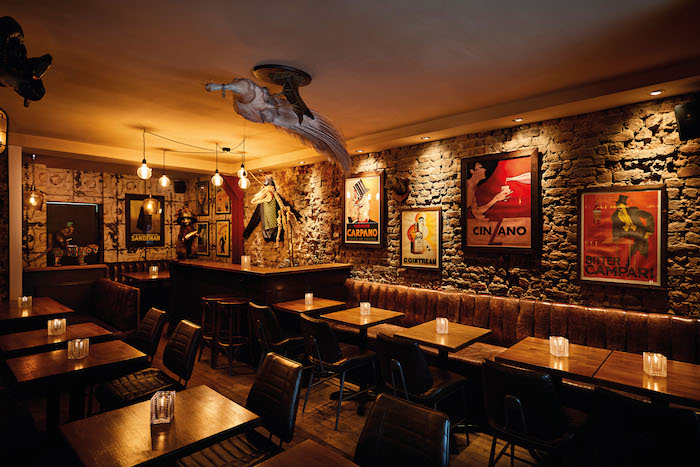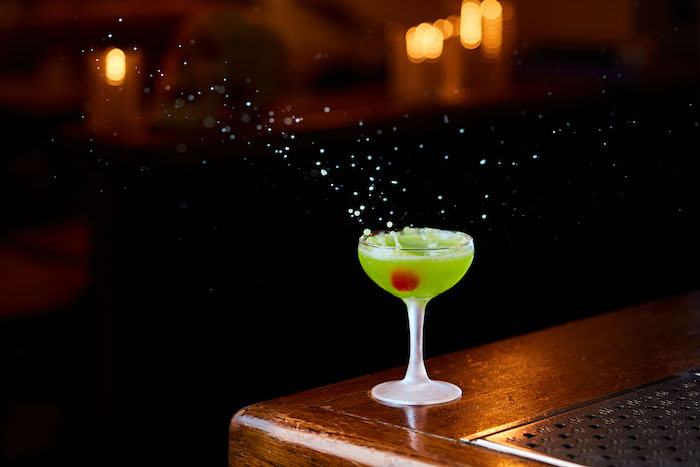
Hamish Smith takes a seat next to Kevin Armstrong at Satan’s Whiskers to hear one of the lesser-told stories of bar success.
A couple of cocktails deep, and I’m getting into it with Satan’s Whiskers’ owner Kevin Armstrong. It’s the kind of conversation I realise I haven’t had in a while: bullshit-busting takes on what actually makes a good bar.
And guess what, we’re not talking about superficially sustainable cocktails, lab-reared liquids or utterly bonkers menus. No, there’s a pretty good argument to say the things that make a bar good are the things you don’t notice, the small details that add up to the big picture.
It’s the height of your seat and the way your elbows fall on the table. It’s how sound can be pitched to co-exist with conversation, from wherever you are in the bar. The level of the light, and then there’s service and the bartending method itself – between Armstrong and his long-time bartender Daniel Waddy they have literally written the book on it (Roundbuilding).
And yet, when I think back over a decade of Satan’s Whiskers, I’ve always struggled to know exactly what to write. This is a bar that doesn’t deal in sharp hooks and piercing headlines. No annual menu launches, no marketing events beyond the odd guest shift, and what personnel changes there are aren’t publicly communicated outside of social media – PR is something for other bars.
Satan’s is just Satan’s – it’s about the doing, not the talking. Bartenders, who quite often line the bar, have always known this place is mustard. And that appreciation shows up year after year in awards, whether Satan’s seeks them or not. In 2023 it took the Class Bar Awards’ Best Bar in London and made it two lists in a row at The World’s 50 Best Bars. Awards are never the aim, they are merely a byproduct of success.
In good bars you can often see the lineage, and in the details Satan’s is the child of Match Bar Group thinking. Kevin Armstrong worked for Jonathan Downey, whose bars included Trailer Happiness and Milk & Honey London (which would go on to win World’s Best Bar, twice).
Downey connects to US bar royalty – the late Sasha Petraske and Dale DeGroff – and there aren’t many greater influencers on modern bar culture than the three of them. Armstrong is one branch down on the family tree.
By 2007 Armstrong had become a consultant, conducting brand training around the world and in doing so spreading these bartending ideals to thousands of bartenders in dozens of countries. Then came a bar fruit wholesaling business and then pubs. You can see the legacy of each of these experiences in the bar he launched in 2013 with Fraser Chapman and Damian Benjamin – Satan’s Whiskers.
You have to get your head into 2013 to understand why Satan’s was different. It was a time transitioning between two others. One camp did speakeasies playing jazz with bartenders-cum-drinks-historians dressed in garters and bow ties and then there was the more modern movement – brilliant as it was, at times it saw innovation at the expense of the fundamentals of the bar experience.
Satan’s did neither. It took classic drinks but spun them with daily fresh ingredients. It relied on traditional bartending methods, attempted to be consistently great at the basics, and be a local to its audience, not a destination for the world. In the end it proved to be both.
After 10 years, this place seems to be getting better – it’s no coincidence that it has really hit its straps since Armstrong took full control of the business. But that’s enough from me.
In the words of Kevin Armstrong, here’s what makes Satan’s Satan’s.

The Satan’s Whiskers team. Top row from left: Kevin Armstrong, Keila Urzaiz de Calignon, Mia Kumari, Daniel Waddy, Emilio Di Salvo, Yoann Tarditi Bottom row: Jelena Kovačević, Ollie Sagerström Blom
Kevin Armstrong on the team
I am a hugely vocal advocate that a bar is only as good as the team that operates it, but this needs to be cultivated and nurtured. So many modern venues are built around a figurehead or superstar bartender. This is fine, of course, so long as they’re always there, but what happens when they leave, and you take away the star attraction?
Over the 10 years we’ve had great bartenders here – Andy Loudon, Marcis Dzelzainis and Nicole Sykes stand out. The current team is the best we’ve had: Emilio [Di Salvo] is the bar manager; Dan [Waddy], Ollie [Sagerström Blom] and Yoann [Tarditi] are bartenders; Mia [Kumari] has just started as a bartender; Keila [Urzaiz de Calignon] is a bartender and is front of house with Jelena [Kovačević] and Julie [Guillouard], who’s part time.
I cannot understate their importance to the success of the business these past few years. We have managed to assemble a group of professionals who are of exceptional quality, and collectively represent the best team of people I have worked with. Each contributes different qualities and skill sets, and their personalities, the way they represent the business, is exactly what I look for. It’s never completely plain sailing, of course, but as a team they have bought into the way we try to operate, our product, the type of hospitality we want to deliver, and they’ve found their own way of delivering that. When I’m present in the venue during service this continues to blow me away, and in many respects, this is something you simply cannot teach. The professionalism, work ethic, and the way they deliver on the values of the business is nothing short of remarkable.
[When recruiting] I like to see bartenders come for a minimum of two to three years. The biggest alarm bell is when you see someone has spent six months, a year at a bar. You can’t achieve much in six months, and familiarity is good for business. On business and culture
Costs are insane at the moment, but the business is well run and cocktails are high margin, so I’m not going to penny pinch with the staff so that there's more in it for me. If the business is doing okay, the team get pay rises, they’ll get a bonus and a gift at Christmas and we take them out on regular lunches at London’s best restaurants. Culture is a fundamental thing. Finding ways to retain the team and promote work-life balance should not be underestimated. If a member of the team wants to learn a new skill that will push themselves and the business forward, they just need to ask and we’ll try to find a way to facilitate that learning.
On the bartending method
Dan and I have built up a wealth of knowledge over a decade. Things that are demonstrable, replicable and that make making drinks incrementally better. In the past 18 months we decided to tell people about it and as part of that we’ve written a book called Roundbuilding. No matter what drinks you serve, measurable inputs become measurable outputs. We attempted to understand and answer so many of the fundamental questions that surround practical bartending. This empirical work has informed our choices, and methods, and continues to do so. It has allowed us to state with accuracy how changing a process will impact the outcome of a specific cocktail and what steps we can take to maintain the integrity of a round of cocktails. But if there is a better way, and you can show us why, we will adopt it.
On menus
The menu changes every day – sometimes we remove six drinks, sometimes 10 or 20. We have about 900 drinks to choose from. When we opened, we had already created about 300 drinks that we were happy to serve and were great and then, after about a year, Dan and I went through the whole process again and we made everything again to see if we could find improvements. And that’s just continued to evolve as new drinks are added. Everyone gets mailed the specs when they’re updated. You can learn them at your own rate, but ultimately learning so many drinks keeps bartenders interested.
On cold drinks
No matter how good you are, how efficient and how technically capable, there's only so far you can go without the right equipment. If you haven’t got enough freezers, you basically can’t make cocktails cold enough. With just fridges, it’s impossible. If you can get a cocktail into someone’s hand at -3° you’re doing well. At Satan’s we do everything we can to make sure that the drink in your hand at five o'clock is as cold as the one at 10 o'clock.
I’ve been to bars where they’ve run out of ice. It’s like being in a restaurant and them running out of plates – you just can’t do it. The lesson here is that if you’re going to build a venue from the ground up, make sure you’ve done your homework and buy a unit that can make enough ice for your needs. We’ve got two big ice machines that are way bigger than we ever needed.
 On operating a bar
On operating a bar
Bars which are bartender operated are great at one element – beverages. An operator brings the guests side of things. You need elements of both, because creating spaces that feel awesome – that’s a genuine skill. I learned a phenomenal amount from watching Jonathan Downey open and design bars.
Operators are not just thinking about what the drinks menu looks like. They're thinking about how everything else works. Are there enough coat hooks so when the guest sits down they’re not fumbling around under the bar? If guests are going to sit there for hours, the table shouldn’t have hard edges and the counter height has to be right in relation to the stool or chair. Good operators know this. There’s not a hierarchy – drinks are not more important than everything else, everything is as important as everything else. It’s a holistic approach.
On creating atmosphere
We’ve all been to bars where the product isn’t amazing but you still don’t want to leave – everything feels just right. You’re comfortable, not too hot and not too cold. The people are nice. The lighting is right – everyone looks good under yellow light – and there are plenty of speakers, the sound is rich and deep. I’ve sat in every seat in this building – and if I notice a way to make the experience better, I will. Unless it’s cripplingly expensive to sort it out, do it. It’s inexcusable not to. If you’ve noticed it, someone else will.
The decision to play hip-hop as the venue’s primary genre of music instantly made the space feel better. The depth of the bass and the tempo of what we played had a noticeable impact on the time our guests stayed for and, I would argue, the pace at which they would drink. You could feel the difference, especially compared to the venues we’d worked at where the tempo was slower. For once, it felt like fun.
On PR
We’ve never had PR. Keila does all our social media, and she’s done a phenomenal job – I’m shit at it, but she’s a natural. I understand the value of marketing, it’s just not what I’m good at and I don’t think a small independent business should spend £40k a year on PR and marketing. The best marketing for us is that everyone leaves saying “that was brilliant” and they tell their mates. It’s a much slower burn, but if you get to the critical mass, it’s enough to sustain the business. For a bar in Bethnal Green, with a smaller audience to draw on, life and death is in repeat business. The best affirmation you can have is a room full of people that want to come back.
On guest shifts
For years we didn’t do guest shifts – I said no to everyone who asked. We made the change coming out of the pandemic – so now we’ve done a few. We’ve had Wax On from Berlin, Schofield’s from Manchester, Candelaria from Paris.
Some bars don’t care who they work with, they just want to be seen and break into the upper circle, but integrity can be easily lost in guest shifts. There are people who’ve asked to work with us where there’s no gain – for either. No overlap or synergy, a friendship, something that ties businesses together. When we do guest shifts we want to do the education bit as well – a talk, sharing our approach and message. That’s really important to us. Integrity is an important tenet of forming a business. This goes for brand events too.
If there’s no obvious reason for working with a product you don’t sell at your bar, then no. I have a reputation for saying no – and it’s easy if it’s not right for the business. Honesty is the best way; money is not everything.
On being a bartenders’ bar
We get bartenders come here from all across town. They enjoy drinking with us as they’re not getting ripped off. We’re accessible, affordable, comfortable and good at what we do – in terms of technical bartending, we have some of the best. On liquor There is little you can’t accomplish with good liquor, good ice and a good freezer. We don’t have a rotovap or anything like that at Satan’s. We make a handful of syrups, we occasionally flavour spirits. It takes too long and I don’t think it’s better. There are companies that make vermouth for 200 years and you have bartenders who think they can do it better.
When we opened we blind tasted every spirit behind the bar and we still do this – just recently we went through our tequilas. That’s how we evolve the back bar – decisions are made blind. Why would you not? It’s not about whoever’s paid the most money. If you’re approaching it like that you’re going down the wrong track. There’s an integrity to the spirits you serve. We have pouring deals but we approach the people whose product we like. Invariably they say yes, but we’ll use the product regardless.
 On pre-batched vs made fresh
On pre-batched vs made fresh
Bartenders are increasingly sommeliers with cocktails. They’re opening something and pouring it. I don’t dislike pre-batching – if you don’t have much space, or you want to increase speed, it can be hugely beneficial, and we do batch some ingredients. Consistency isn’t necessarily better though – it depends on how good you are at batching. If you make a mistake, you ruin the batch. When we make a mistake making a drink – we taste every drink we serve – we pick it up.
What I hate about pre-batched drinks is that the guest loses the opportunity to have a drink made that is customised to them.Drinking is such a personal thing. Bars aren’t restaurants – if someone wants their Margarita sharper, we can do that for them. Having something tailored to you is unique to the bar environment. That customised drinking experience is gone with pre-batched. You may as well drink wine.
On pouring
There is a tacit assumption that bartenders using jiggers/measures of any kind must be, at the very least, working accurately. I can state with clarity this is a false assumption. Practice with just about anything will make you better and more proficient. Our speed and accuracy test is there for that reason. We have been doing this for a long time and we’ve tested hundreds of bartenders – most, even famous ones, do not perform well at this test, but the more you practise, the better you get.
The test is also useful for highlighting that even the best bartenders make mistakes when pouring, and for that reason it is essential that you taste your cocktails before serving them. If you don’t, or it’s not part of your service plan, too frequently you’ll send a shocking drink across the bar.
On longevity
I think about longevity a lot – I value it more than flashes of media fame. While for the first six or seven years of the business, nobody really paid much attention, more recently we’ve found ourselves in the spotlight, with the wheel finally having turned enough for us to be considered relevant in the fast-paced and ever-changing world of cocktail bartending.
What has been most satisfying during this whole process is that we have always kept our focus on being a consistent and value-based neighbourhood bar. Irrespective of the position we find ourselves in currently [in terms of recognition], which will no doubt be fleeting, we have always had a bar that has been full of returning, and generally happy, customers.


